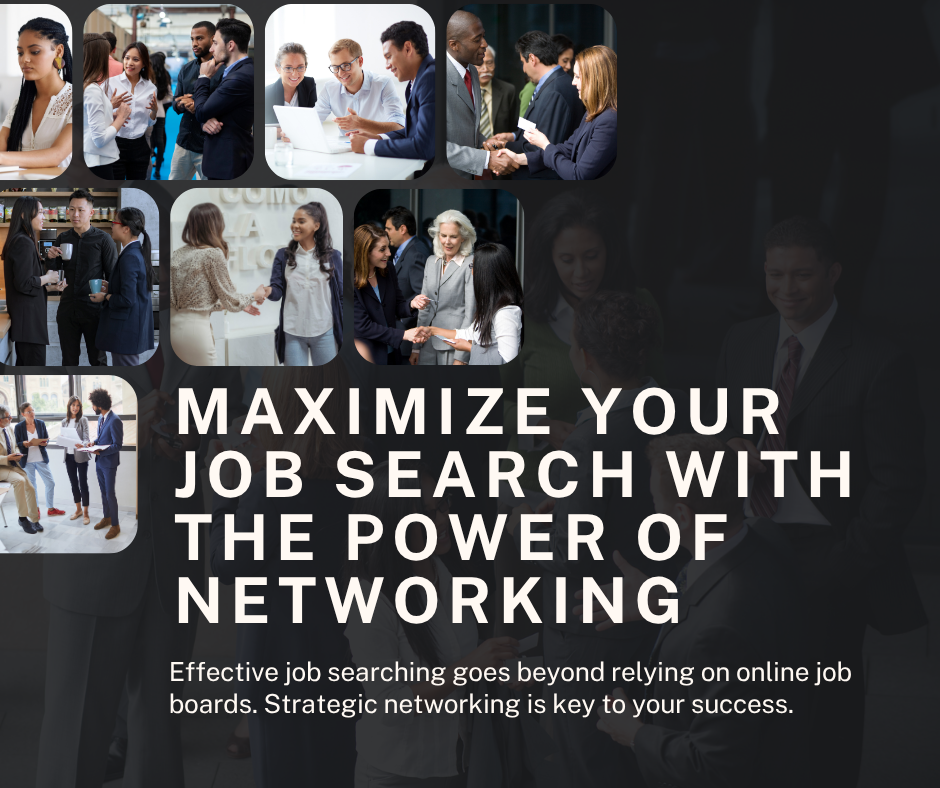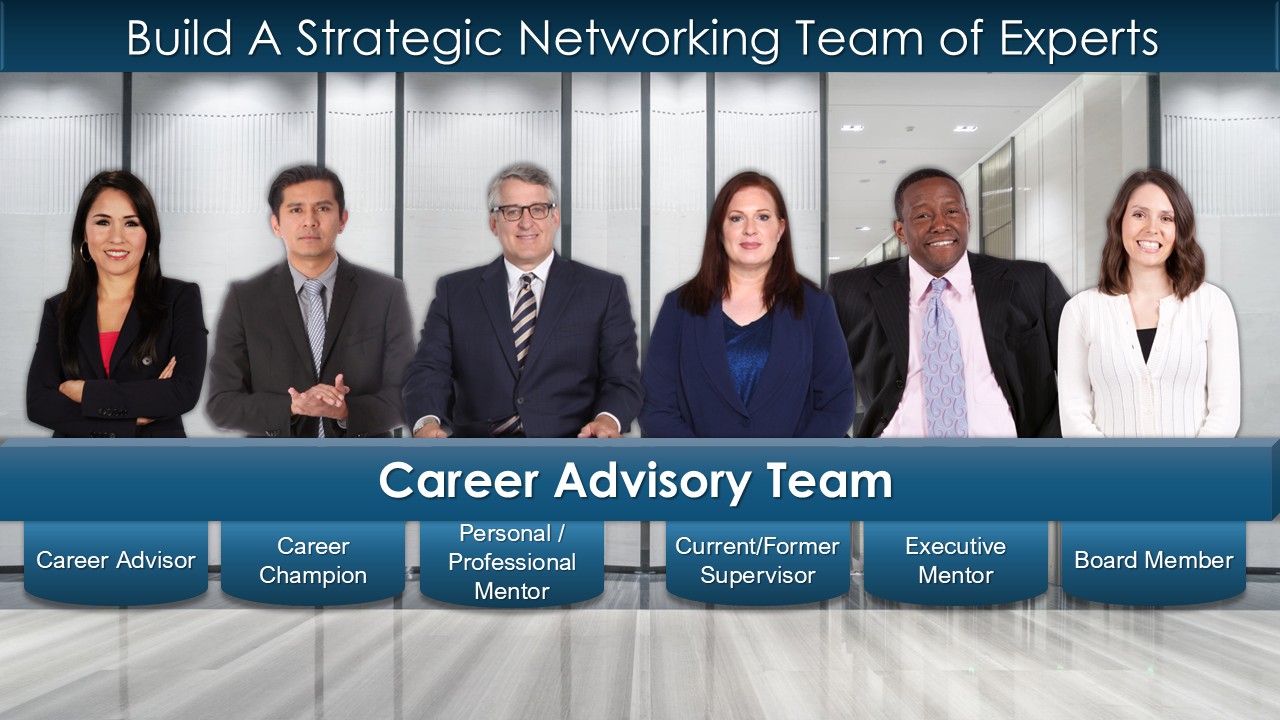MAXIMIZE YOUR JOB SEARCH WITH THE POWER OF NETWORKING

By Alex Harrington, GCDF, CCSP
Editorial Note: This blog is part of a series written for fellow federal employees who, like me, are facing the challenge of moving on after a career in public service. After nearly 30 years—serving first in the U.S. Marine Corps and then as a federal civil servant—I’ve found myself among those impacted by the current Administration’s workforce reductions. Accepting the Department of Homeland Security’s early retirement offer was not an easy decision, but it has placed me on a new path. One that I know many of you are walking as well. My goal in this series is to share practical tools, strategies, and encouragement drawn from both my professional credentials and my own transition journey, with ChatGPT helping me refine and organize these ideas so they’re ready to support you in your next chapter.
______________________________________________________________________________________________________
BLUF (Bottom Line Up Front)
Effective job searching goes beyond relying on online job boards. Strategic networking is key to your success. Strategic networking involves leveraging personal and professional relationships, organizing contacts into key groups, building a team of career advocates, and using tools like elevator pitches and online profiles to connect purposefully, with the understanding that networking is a long-term investment in building as supportive community that enhances career opportunities.
Introduction
When searching for your next opportunity, one of the biggest mistakes job seekers make is relying too heavily on job boards like Indeed, LinkedIn, or ZipRecruiter. While these platforms can be helpful, depending solely on them is like putting all your eggs in one basket—they represent just one piece of the job search puzzle. In fact, data indicates that candidates who focus primarily on online applications typically achieve a success rate between 2% and 10%, with some reports suggesting even lower rates—particularly for those with only a high school diploma, whose chances of being noticed may be as low as 1–2%. For applicants receiving interviews from just 2% to 10% of their online submissions, this translates to submitting around 100 applications to secure 2 to 10 interview invitations. These paltry figures underscore the importance of complementing online applications with proactive networking and targeted outreach to maximize your prospects.
Why Networking Works
You have heard it before: “It’s not just what you know, it’s who you know.” And while that may sound cliché, it remains a vital truth in the job market. In fact, according to the late career expert Richard Bolles, 60% of hires result from referrals. However, many job seekers concentrate exclusively on submitting applications instead of utilizing their professional networks.
The truth? Networking isn’t a “nice to have”—it is a “MUST HAVE.”
How to Begin Networking
Networking is not only about attending events or sending messages on LinkedIn. You are already networking every day without realizing it—talking to friends, family, neighbors, or former coworkers. The key is to become more intentional and strategic.
The following outlines the initial steps to begin:
Start with people you know. Reach out to friends, family, former colleagues, and mentors. Let them know you’re exploring new opportunities.
Be clear and concise. As Bob Korzeniewski, the Executive Director of Career Network Ministry, would say networking boils down to AIR (advice, information and referrals). Know what you are asking for—whether it’s an informational interview, a referral, or simply advice.
Offer value. Networking is not about asking for favors. It is about building relationships—and that means giving as much as you get.
Organize Your Network into Five Key Groups
To be more strategic, I recommend grouping your network contacts into groups...something like this:
Personal Relationships: Family, friends, neighbors, religious leaders, and support groups.
Professional Contacts: Former colleagues, managers, mentors, clients, and vendors.
Organizational Affiliations: Alumni networks, industry associations, nonprofit boards, and civic groups.
Opportunistic Networks: Volunteers, classmates, conference attendees, and people you meet in professional development courses.
Social media: LinkedIn, Facebook groups, Slack communities, and professional forums.
Build A Strategic Networking Team of Experts
Building an intentional and diverse professional network can enhance your job search and career development. Below are key roles you should consider incorporating into your networking strategy, each offering distinct value:

Career Advisor: A Career Advisor offers strategic insight into career navigation. They listen closely, provide tailored advice, and offer constructive feedback, especially when you may be at a crossroads or risk missteps. Their counsel is rooted in understanding organizational culture and career progression strategies.
Career Champion: A Career Champion is an active advocate who promotes your potential, connects you with meaningful opportunities—such as temporary assignments or full-time roles—and expands your visibility by introducing you to internal and external networks. They provide encouragement and help keep your career trajectory moving forward.
Personal/Professional Mentor: A Personal or Professional Mentor offers seasoned advice from a more experienced perspective. They support your long-term growth by guiding career planning, decision-making, and implementation, and by helping you assess the best pathways forward in your professional journey.
Current/Former Supervisor: A Supervisor—whether they are current or former—is someone who oversees your daily performance and manages your formal evaluations. They can advocate for your development, provide critical feedback, and help align your performance goals with broader organizational objectives and long-term career aspirations.
Executive Mentor: An Executive Mentor serves as an advisor or coach to help you navigate complex leadership challenges and position your experience to support senior-level decision-making.
Board Member: A Board Member—whether from a nonprofit, professional association, or advisory board—brings a strategic, high-level view of your industry or sector. Cultivating relationships with board members can open doors to leadership opportunities, provide access to influential networks, and position you for future board or executive-level roles.
Stand Out with These Networking Tools
Use these tools to leave a strong impression:
1. Elevator Pitch
Prepare a 30–60 second introduction that outlines:
Who are you?
What do you do?
What you are passionate about.
What you are seeking.
Example: “My name is Alex Harrington, and I am a mission-driven leader with nearly 25+years of federal experience in organizational development, workforce strategy, and leadership development. I have led enterprise-level programs focused on performance improvement, change management, and employee development—both domestically and abroad in Japan, Korea, and Germany. Outside of government, I have spearheaded community initiatives that have helped thousands of jobseekers navigate career transitions. Now, I am looking to apply my skills in leadership, training, and organizational growth to a mission-driven organization like yours.”
2. Networking Card
Lily Whiteman, author of How to Land a Top-paying Federal Job, and a trainer of career advancement skills and communication skills, recommends designing a basic business card with your name, title, contact info, and top skills or achievements to make a memorable impression.
3. One-Page Résumé
A concise résumé summary is an excellent leave-behind or follow-up item. Focus on your top achievements and transferable skills.
4. Online Presence
Regardless of your personal preferences, social media has become an integral component of the professional environment. LinkedIn serves as a premier platform for networking, effectively combining a digital business card, résumé, and portfolio into a single resource. To maximize its benefits:
1) Complete your profile (aim for 100%).
2) Join groups and engage in conversations.
3) Ask for endorsements or recommendations.
4) Share your thoughts on industry trends.
Remember: your online activity helps you stay top-of-mind and establishes you as a credible professional in your field.
Reach Out with Purpose
When reaching out to a new contact or industry peer, skip vague or transactional requests; instead:
Have a clear reason for reaching out. Let them know what you admire about their work or what you would like to learn from them.
Make it easy to say yes. Suggest a short 15-minute call or virtual coffee chat.
Prepare a few thoughtful questions. This shows respect for their time and keeps the conversation focused.
Final Thought: Networking is a Marathon, Not a Sprint
Building and nurturing professional relationships takes time, care, and authenticity. The goal is not to “get something”—it is to grow a community of allies who know your value and can vouch for your character and skills.
Even if you are not job searching today, invest in your network now. It is one of the best assets you will ever have.


